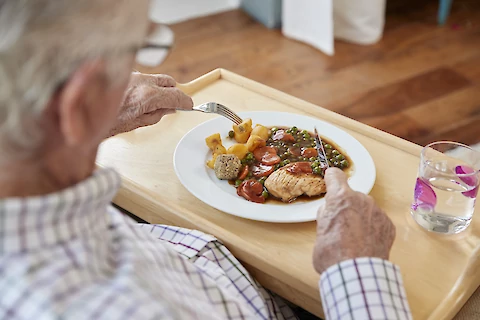
Arthritis can pose several challenges for seniors. Holding and using conventional cutlery can be a struggle due to limited mobility and hand strength. However, arthritis doesn't have to impede their independence, especially during mealtimes.
This blog post brings to light a remarkably innovative solution — adaptive utensils. They’re designed to empower seniors with arthritis and help them enjoy meals with comfort and ease. Let’s explore assistive utensils, their functionality, and safe usage. We’ll also look at how their benefits go beyond meal times, enhancing the overall quality of life for our seniors.
Arthritis Challenges Among Older Adults
Arthritis can significantly impact older adults. The condition is known to cause painful joints and lesser strength in the hands. This can affect their ability to perform day-to-day activities, especially eating. As such, the condition jeopardizes the independence and dignity of older adults living with it.
What are Adaptive Utensils?
Adaptive utensils are tableware specially designed to assist individuals with mobility concerns. Their design and functionality, such as easy-grip handles or non-slip surfaces, make mealtimes less of a struggle for arthritic older adults. They empower seniors to enjoy their meals without relying on assistance.
Types of Adaptive Utensils
The market boasts a variety of these innovative utensils, each with features catering to different needs. Weighted utensils, for instance, are designed to counteract hand tremors. Angled utensils require less wrist movement. This makes it easier to direct food into the mouth. Items with large, cushioned handles demand less strength to grip. These are perfect for those with reduced hand strength.
How to Use Assistive Utensils Correctly and Safely
Using these utensils is generally straightforward. Just use them as you would their traditional counterparts. However, holding them correctly is crucial for maximum benefit. For instance, an underhand grip can provide better control over weighted utensils. As for safety, always ensure the tools are cleaned meticulously, especially around the grip areas. This helps avoid potential slips and maintain hygiene.
Beyond Meal Times: Other Benefits of Adaptive Devices
The benefits of these assistive utensils extend beyond mealtimes. The independence and ease of use they provide can improve seniors' self-esteem and overall well-being. There are also adaptive and ergonomic tools that facilitate sturdy, stable grips for activities like writing, painting, and gardening. With this, seniors can engage in hobbies and other activities without discomfort or frustration.
Live Independently With Senior Helpers
Having arthritis should not deter seniors from leading comfortable and independent lives. Adaptive utensils play a significant role in achieving this goal. They alleviate the challenges posed during mealtimes and empower seniors to perform their activities with ease, enhancing their quality of life.
If you or a loved one in Vineland, Atlantic City, Millville, or Mays Landing is considering getting additional support with daily chores or companionship, Senior Helpers Jersey Shore can help. We offer top-notch in-home care services to ensure you experience the freedom and independence you deserve in your golden years. Contact us today to learn more about our services.